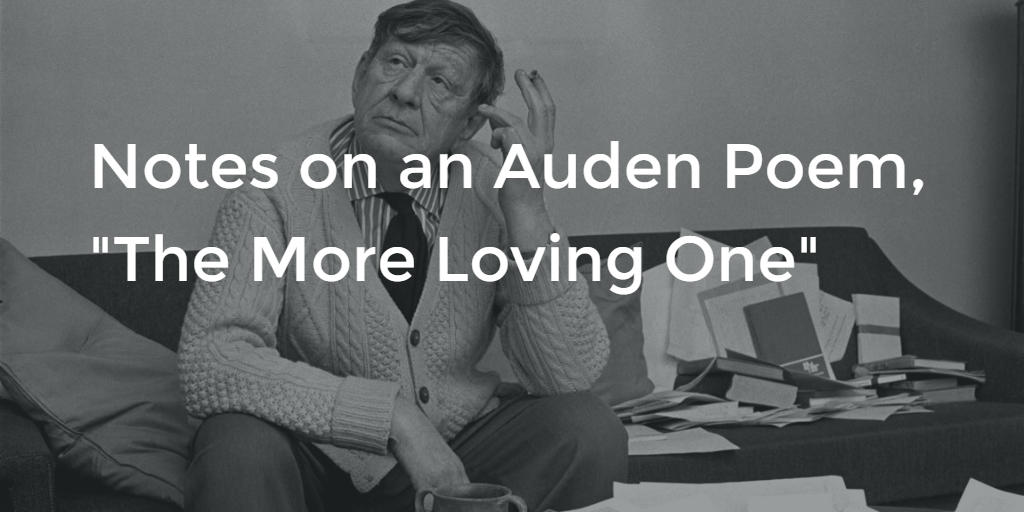I’ve been an Auden fan probably since I first heard his mourning poem in 4 Weddings and a Funeral. (Recall my doggerel.) That he corresponded with Arendt mattered a great deal to my dissertation work; I also quite like the thematic connections between his “The Unknown Citizen” and another favorite poem, “Manifesto: The Mad Farmer Liberation Front,” by Wendell Berry.
Searching online for a W. H. Auden poem to remember a line, I discovered that Rap Genius has a listing of many of his poems, annotated by users of the site. This was to be the original usage of the “hyper-text markup language” that we now abbreviate html: to connect and annotate texts. I’m glad to see the web returning that that usage, and under the auspices of a rap lyrics site, it seems particularly exciting.
Here is the poem I was looking for, “The More Loving One.” I usually remember the poem through its title lines, which occur midway through it:
If equal affection cannot be,
Let the more loving one be me.
There’s something pleasant about the sense of dutiful care in those lines. But perhaps a bit saccharine. And indeed, much of the poem pushes back against the self-abnegating nature of that desire to subordinate oneself to the beloved.
In many ways, the poem is a repudiation of the easy cliche that the line contains: we cannot and should not aim to be always giving more love than we receive. We are always a part of many relationships, not all of which involve “equal affection” and some of which are unequal in the other direction: I love my daughter more than she can love me, and I am loved by my parents more than I can love them.
We see Donald Trump’s current rhetoric around trade deficits making something like the same mistake: it’s not possible for every country to always export more than we import to every other country. One country’s trade surplus is another country’s trade deficit. Nor is it desireable for the US, a very rich country, to aim to be an industrial powerhouse at the expense of industries in poorer countries. Alongside Japan, Europe, the UK, and China, the US dollar is a reserve currency useful for future spending. Lowering the trade deficit paradoxically would make the US dollar more desirable by lowering the supply. (Ironically the US has lowered its trade deficits lately as other currencies like the euro and China’s yuan have grown in use as reserves.)
Auden’s poem doesn’t just correct the poor math of “the more loving one,” it makes a few interesting points. For instance, Auden begins with the claim that indifference is preferable to many other emotions that human beings offer to each other, like hatred. This seems almost obvious, but it’s worth noting that the celebrated writer Elie Wiesel has claimed that indifference is the opposite of love, recognizing that hatred also shares some of the attachment of loving.
But this can be taken too far. In a plea for action and a praise for the intervention in Kosovo, Wiesel even hyperbolically claimed that indifference to the suffering of victims was almost worse than perpetrating that suffering:
Rooted in our tradition, some of us felt that to be abandoned by humanity then was not the ultimate. We felt that to be abandoned by God was worse than to be punished by Him. Better an unjust God than an indifferent one. For us to be ignored by God was a harsher punishment than to be a victim of His anger. Man can live far from God — not outside God. God is wherever we are. Even in suffering? Even in suffering.
Auden points out quite simply that this is silly; being left alone is better than being persecuted.
But his most damning recognition is that the lover’s love is in some ways selfish: Auden recognizes that for all his efforts, he doesn’t love the stars as much as his poetry would make it seem. He doesn’t miss them when they’re gone during the day, and even were they to be lost forever, he would still find something else loveable. The stars are just one of the beautiful and sublime ways that the world arises. I suspect that he exercises his poetic will in order to love the world as such, in all its diversity, no matter how it presents itself to him.
Were all stars to disappear or die,
I should learn to look at an empty sky
And feel its total dark sublime,
Though this might take me a little time.

Leave a Reply